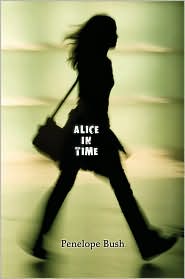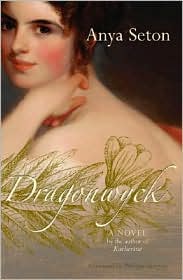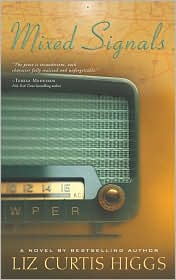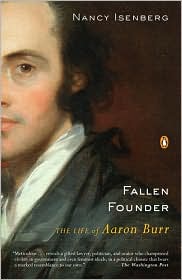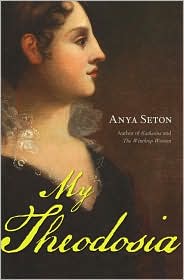I read a lot of MG fiction in July! Included are some great classics like Heidi, The Light Princess, The Trumpeter of Krakow, and The Story of the Amulet. I also discovered some great new-to-me authors like Anya Seton, George MacDonald, P.D. James, and Bo Caldwell. This month I've read some GREAT books that I've just loved and adored. But it also had some not-so-great books. Still I'm pleased with what I accomplished this month.
As far as challenges go, I was able to read at least one book for each of these challenges: New Author Challenge, 2011 TBR Challenge, TBR Pile Challenge, Historical Fiction, Victorian Literature Challenge, The Classic Bribe Challenge, Agatha Christie Reading Challenge, Cruisin' Thru the Cozies.
This month I read 36 books.
Board books: 2; Picture books: 1; Middle Grade: 13; Young Adult: 4; Adult: 5; Christian Fiction: 6; Christian Nonfiction: 4; Nonfiction: 1.
Review copies: 11; Library books: 18; Books I bought: 7.
My topfive six:
City of Tranquil Light. Bo Caldwell. 2010. Henry Holt. 304 pages.
Trauma Queen. Barbara Dee.
Heidi. Johanna Spyri.
The Light Princess. George MacDonald.
Withering Tights. Louise Rennison.
Mine is the Night. Liz Curtis Higgs.
Elephants Can Remember. Agatha Christie. (Hercule Poirot). 1972. 212 pages.
Cover Her Face. P.D. James. 1962. 254 pages.
Sense and Sensibility. Jane Austen. 1811. (The Complete Novels) Random House. p. 3-175.
My Theodosia. Anya Seton. 1941/2007. Chicago Review Press. 432 pages.
Dragonwyck. Anya Seton. 1944/2005. Chicago Review Press. 352 pages.
The Search for Wondla by Tony DiTerlizzi. 2010. Simon & Schuster. 477 pages.
Trauma Queen. Barbara Dee. 2011. Simon & Schuster. 272 pages.
No Passengers Beyond This Point. Gennifer Choldenko. 2011. Penguin. 256 pages.
Smells Like Treasure. Suzanne Selfors. 2011. Little, Brown. 416 pages.
The Story of the Amulet. E. Nesbit. 1906. 228 pages.
The Hidden Gallery (The Incorrigible Children of Ashton Place #2) Maryrose Wood. 2011. HarperCollins. 320 pages.
Heidi. Johanna Spyri. 1880/2009. Puffin Classics/Penguin. 320 pages.
Heidi Grows Up. Charles Tritten. 1938. 190 pages.
Heidi's Children. Charles Tritten. 1939. 255 pages.
The Light Princess. George MacDonald. 1864. 110 pages.
The Trumpeter of Krakow. Eric P. Kelly. 1928. 208 pages.
Swift Rivers. Cornelia Meigs. 1932/2004. Walker. 288 pages.
Alice in Time. Penelope Bush. 2011. Holiday House. 208 pages.
Star-Crossed. Linda Collison. 2006. Random House. 416 pages.
Possession. Elana Johnson. 2011. Simon & Schuster. 416 pages.
Withering Tights. Louise Rennison. 2011. HarperCollins. 288 pages.
Are You Going To Kiss Me Now? Sloane Tanen. 2011. Sourcebooks. 368 pages.
Genrefied Classics: A Guide to Reading Interests in Classic Literature. Tina Frolund. 2007. Libraries Unlimited. 392 pages.
I Like Vegetables. Lorena Siminovich. 2011. Candlewick Press. 10 pages.
I Like Toys. Lorena Siminovich. 2011. Candlewick Press. 10 pages.
Grump. Janet Wong. Illustrated by John Wallace. 2001. Simon & Schuster. 32 pages.
My First Read and Learn: Book of Prayer. Dr. Mary Manz Simon. 2007. Scholastic. 40 pages.
Mine is the Night. Liz Curtis Higgs. 2011. Waterbrook. 464 pages
Read Your Bible One Book At A Time: A Refreshing Way To Read God's Word with New Insight and Meaning. Woodrow Kroll. 2002. Gospel Light Publications. 150 pages.
How to Find God in the Bible: A Personal Plan For the Encounter of Your Life. Woodrow Kroll. 2004. Multnomah. 204 pages.
City of Tranquil Light. Bo Caldwell. 2010. Henry Holt. 304 pages.
Embrace Grace: Welcome to the Forgiven Life. Liz Curtis Higgs. 2006. Waterbrook Press. 160 pages.
To The One Who Conquers: 50 Daily Meditations on the Seven Letters of Revelation 2-3. Sam Storms. 2008. Crossway Books. 240 pages.
Bookends. Liz Curtis Higgs. 2000. Multnomah. 340 pages.
Safely Home. Randy C. Alcorn. 2011. Tyndale. 434 pages.
Mixed Signals. Liz Curtis Higgs. 1999. Multnomah. 384 pages.
© 2011 Becky Laney of Becky's Book Reviews
As far as challenges go, I was able to read at least one book for each of these challenges: New Author Challenge, 2011 TBR Challenge, TBR Pile Challenge, Historical Fiction, Victorian Literature Challenge, The Classic Bribe Challenge, Agatha Christie Reading Challenge, Cruisin' Thru the Cozies.
This month I read 36 books.
Board books: 2; Picture books: 1; Middle Grade: 13; Young Adult: 4; Adult: 5; Christian Fiction: 6; Christian Nonfiction: 4; Nonfiction: 1.
Review copies: 11; Library books: 18; Books I bought: 7.
My top
City of Tranquil Light. Bo Caldwell. 2010. Henry Holt. 304 pages.
Trauma Queen. Barbara Dee.
Heidi. Johanna Spyri.
The Light Princess. George MacDonald.
Withering Tights. Louise Rennison.
Mine is the Night. Liz Curtis Higgs.
Reviews at Becky's Book Reviews:
Elephants Can Remember. Agatha Christie. (Hercule Poirot). 1972. 212 pages.
Cover Her Face. P.D. James. 1962. 254 pages.
Sense and Sensibility. Jane Austen. 1811. (The Complete Novels) Random House. p. 3-175.
My Theodosia. Anya Seton. 1941/2007. Chicago Review Press. 432 pages.
Dragonwyck. Anya Seton. 1944/2005. Chicago Review Press. 352 pages.
The Search for Wondla by Tony DiTerlizzi. 2010. Simon & Schuster. 477 pages.
Trauma Queen. Barbara Dee. 2011. Simon & Schuster. 272 pages.
No Passengers Beyond This Point. Gennifer Choldenko. 2011. Penguin. 256 pages.
Smells Like Treasure. Suzanne Selfors. 2011. Little, Brown. 416 pages.
The Story of the Amulet. E. Nesbit. 1906. 228 pages.
The Hidden Gallery (The Incorrigible Children of Ashton Place #2) Maryrose Wood. 2011. HarperCollins. 320 pages.
Heidi. Johanna Spyri. 1880/2009. Puffin Classics/Penguin. 320 pages.
Heidi Grows Up. Charles Tritten. 1938. 190 pages.
Heidi's Children. Charles Tritten. 1939. 255 pages.
The Light Princess. George MacDonald. 1864. 110 pages.
The Trumpeter of Krakow. Eric P. Kelly. 1928. 208 pages.
Swift Rivers. Cornelia Meigs. 1932/2004. Walker. 288 pages.
Alice in Time. Penelope Bush. 2011. Holiday House. 208 pages.
Star-Crossed. Linda Collison. 2006. Random House. 416 pages.
Possession. Elana Johnson. 2011. Simon & Schuster. 416 pages.
Withering Tights. Louise Rennison. 2011. HarperCollins. 288 pages.
Are You Going To Kiss Me Now? Sloane Tanen. 2011. Sourcebooks. 368 pages.
Genrefied Classics: A Guide to Reading Interests in Classic Literature. Tina Frolund. 2007. Libraries Unlimited. 392 pages.
Reviews at Young Readers:
I Like Vegetables. Lorena Siminovich. 2011. Candlewick Press. 10 pages.
I Like Toys. Lorena Siminovich. 2011. Candlewick Press. 10 pages.
Grump. Janet Wong. Illustrated by John Wallace. 2001. Simon & Schuster. 32 pages.
Reviews at Operation Actually Read Bible:
Mine is the Night. Liz Curtis Higgs. 2011. Waterbrook. 464 pages
Read Your Bible One Book At A Time: A Refreshing Way To Read God's Word with New Insight and Meaning. Woodrow Kroll. 2002. Gospel Light Publications. 150 pages.
How to Find God in the Bible: A Personal Plan For the Encounter of Your Life. Woodrow Kroll. 2004. Multnomah. 204 pages.
City of Tranquil Light. Bo Caldwell. 2010. Henry Holt. 304 pages.
Embrace Grace: Welcome to the Forgiven Life. Liz Curtis Higgs. 2006. Waterbrook Press. 160 pages.
To The One Who Conquers: 50 Daily Meditations on the Seven Letters of Revelation 2-3. Sam Storms. 2008. Crossway Books. 240 pages.
Bookends. Liz Curtis Higgs. 2000. Multnomah. 340 pages.
Safely Home. Randy C. Alcorn. 2011. Tyndale. 434 pages.
Mixed Signals. Liz Curtis Higgs. 1999. Multnomah. 384 pages.
© 2011 Becky Laney of Becky's Book Reviews
 4:01 PM
4:01 PM
 Nikki
Nikki
 Posted in
Posted in


